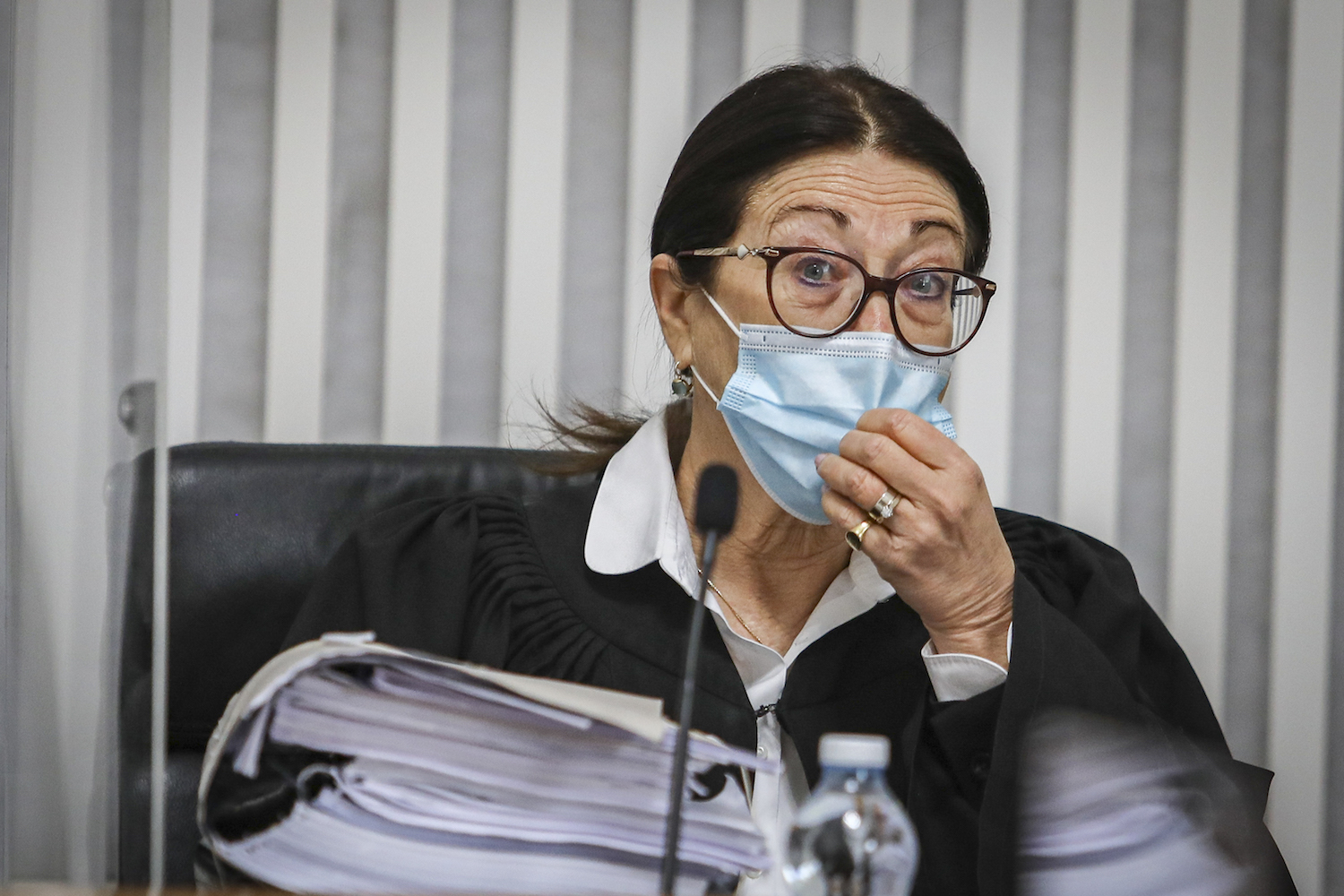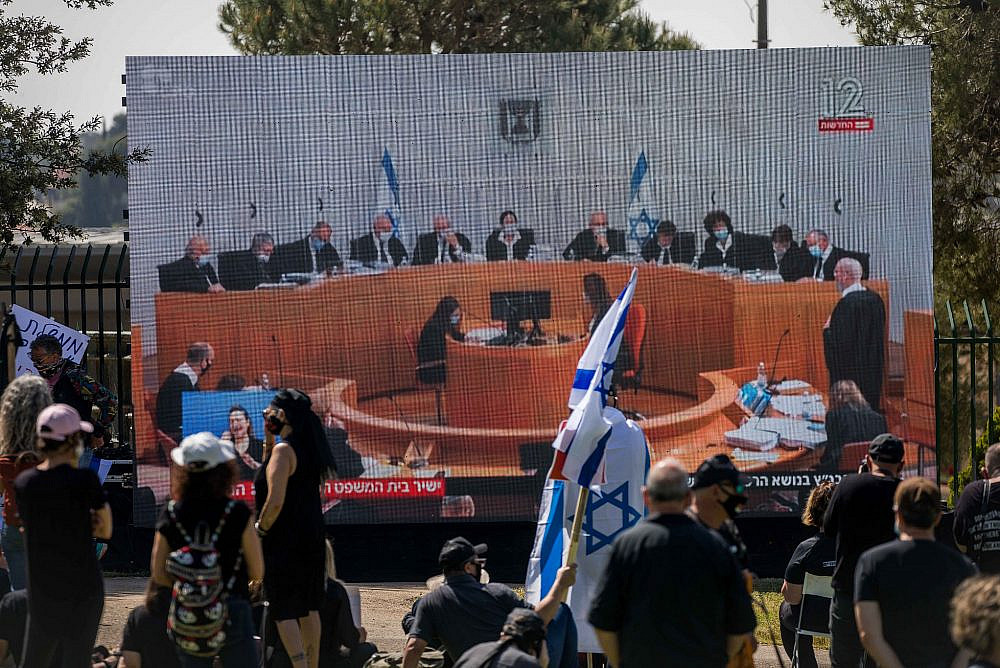It’s over. The attempt to remove Benjamin Netanyahu from office with the help of the Israeli justice system came to an end on Wednesday night, when the High Court ruled that the prime minister can continue to serve while facing corruption charges. Netanyahu could eventually be charged and deposed, of course. But that may take at least three or four years.
It is unconscionable that a man who has been indicted on such serious crimes participated in the elections, received more than a million votes, and has now received the mandate to form the next government. This is a gift to someone who tried to undermine and incite against Israel’s law enforcement agencies — all the way from the police that investigated Netanyahu to the attorney general who decided to file an indictment against him. This is the kind of breach of public norms that should lead anyone suspected of such offenses to retire from political life, at least until their name is cleared. A country headed by a person under indictment for corruption is a sick country.
But we must be honest with ourselves. Many in Israel’s center-left camp had hoped the legal system would help get rid of Netanyahu, not only because they wanted a society free of corruption, but because they believed it was the most effective and “clean” way to end the prime minister’s reign. Particularly after the 2015 elections, in which Netanyahu won the premiership for the third time despite polls showing a victory for the Labor Party, Netanyahu and the right-wing alliance he solidified looked invincible. The sense was that when it came to Election Day, no one could take down the right-wing bloc.

The legal avenue was widely viewed as a way to circumvent Netanyahu’s sure-fire win and the inevitable loss for his political rivals. Despite what Netanyahu and his cronies believe, the cases against the prime minister are no conspiracy theory. There was no revolutionary council sitting behind closed doors trying to “sack the incumbent prime minister.” In fact, the opposite may be true. It is possible that the police and the prosecution were late to investigate things that should have been looked into years ago.
The center-left camp decided to politicize the investigations against Netanyahu. In doing so, it ditched all opposition to Netanyahu’s right-wing government and policies, including the dismantling of Israel’s welfare state; the institutionalization of discrimination against Palestinian citizens of Israel; the entrenching of the occupation and the settlements; the promotion of annexation and apartheid in the West Bank; and the shutting down of any opportunity for potential negotiations.
The decision to turn Netanyahu’s corruption scandals into the center-left’s flagship struggle was partially successful, birthing the success of Blue and White, the ad hoc “anyone but Bibi” alliance that won more than 30 Knesset seats over three straight elections and did far better than any centrist party since the 1990s. It is likely that the investigations and indictments prevented Netanyahu and his right-wing bloc from getting their vaunted 61 Knesset seats over the last three election cycles.
But it was not enough. Netanyahu and his allies are not stupid. From the moment the Jewish center-left chose the legal route, it paved the right’s way to victory. It was easy for Netanyahu and his associates to make the case that the prime minister’s opponents do not truly care about upholding the rule of law, they simply want to keep the right as far away as possible from the corridors of power. This claim, which has a grain of truth to it, was enough to keep the right-wing bloc together, despite its relatively poor showing in the September 2019 elections.
But that was not the sole reason for the failure of the legal path. Fighting corruption is not much of a political platform. It does not have the ability to provide answers to complex questions that plague Israeli society. The story that has animated Israel’s existence for the past 52 years is the occupation. This, and the notion of “Jewish supremacy,” in which this country belongs solely to one ethnic group, is what defines the State of Israel.
This is precisely why as soon as the 61 Knesset members — from Avigdor Liberman to the Joint List — vowed to not sit with Netanyahu and rallied around Benny Gantz, the entire camp crumbled to pieces. As Haggai Matar wrote on these pages in late March, the minute Gantz had to make a choice between corruption and sitting in a government backed by the Joint List, he went with the former. Of course, a center-left government would not have brought about the end of the occupation. But a coalition that would have included nationalists like Liberman alongside Israel’s Palestinian leadership would have posed a significant challenge to the notion of “Jewish supremacy,” and could have opened the door to potentially ending the occupation and Israeli apartheid.
In the face of this option, the focus on corruption has been exposed for its inherent weaknesses. It became clear that the anti-corruption warriors do not have a “theory of change,” and that when their political leaders were called upon to make a decision, they buckled. Months after they spent millions on campaigns and billboards to explain to the public why it cannot allow an indicted prime minister to form the next government, the anti-Bibi parties have now given their blessing to Netanyahu to do just that.
One could have seen this coming, but there is no time left to play the blame game. Israel is now leaping toward annexing parts of the West Bank — in complete violation of international law — and effectively legalizing apartheid. We have known for years that there is nothing temporary about the occupation, but Israel’s becoming an annexationist state would call into question its very legitimacy. This is the struggle that needs to be waged now. We must think about how to resist annexation and what to do the day after it comes into effect. Neither the attorney general nor the highest court in the land will be here to help us.
This article was first published in Hebrew on Local Call. Read it here.


